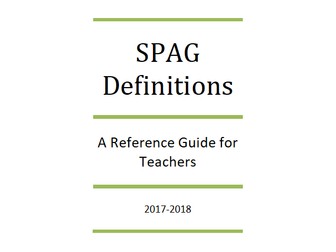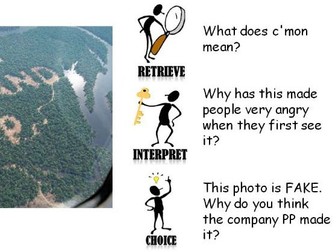SPAG Definition Reference Guide for Teachers
<p>This guide took me literal <strong>days</strong> to create.</p>
<p>This guide contains definitions for hopefully all, if not most, SPAG terminology from Year 1 to Year 6.</p>
<p>It features simple, but accurate, definitions; modelling of the terminology’s use; and also states the year group in which the terminology is introduced (in accordance to the National Curriculum).</p>
<p>The guide was created to ensure the consistency of definitions being taught within a Junior School. All staff received a copy and use it as a reference guide when required. I recommend this is <em>not</em> given to parents as it is a reasonably overwhelming document!</p>
<p>The guide is <strong>editable</strong> as I do not consider myself a SPAG expert. It was created using the Government’s ‘definitions’ within the National Curriculum, reference to SATs SPAG paper questions, the internet and my sister’s understanding of grammar from her English Language degree. Soooo, if it isn’t perfect I won’t be surprised!</p>
<p><em>Definitions Included:</em><br />
**Parts of a Sentence **</p>
<p>Subject <br />
Object<br />
Phrase<br />
Clause (Main)<br />
Sentence (Simple, Compound, Complex)<br />
Statement<br />
Exclamation <br />
Question<br />
Command<br />
Parenthesis</p>
<p>**Word Types & Classes **</p>
<p>Noun (Singular, Plural, Common, Proper, Collective, Abstract) <br />
Noun Phrase<br />
Pronoun (Singular, Plural, Possessive, Relative) <br />
Determiner (Article)<br />
Adjective<br />
Verb (Auxiliary, Modal, Imperative)<br />
Subjunctive Verbs<br />
Adverb <br />
Adverbial Phrases<br />
Preposition<br />
Prepositional Phrase<br />
Conjunction (Co-ordinating, Subordinating) <br />
Subordinate Clause<br />
Relative Clause<br />
Simile<br />
Metaphor</p>
<p>**Tenses & Voices **</p>
<p>Simple Tense <br />
Progressive Tense (Progressive Verbs)<br />
Perfect Tense (Perfect Verbs)<br />
Present Perfect Progressive Tense<br />
Active Voice<br />
Passive Voice</p>
<p>**Punctuation **</p>
<p>Capital Letter <br />
Full Stop<br />
Comma<br />
Apostrophe (Contraction, Possession)<br />
Exclamation Mark<br />
Question Mark <br />
Inverted Commas (Speech Punctuation)<br />
Ellipsis<br />
Brackets<br />
Dash <br />
Hyphen<br />
Bullet Points<br />
Colon<br />
Semi-colon</p>
<p>**Spelling **</p>
<p>Root Word <br />
Prefix<br />
Suffix<br />
Compound Word<br />
Word Families<br />
Antonym<br />
Synonym<br />
Homophone<br />
Homonym<br />
Idiom</p>

